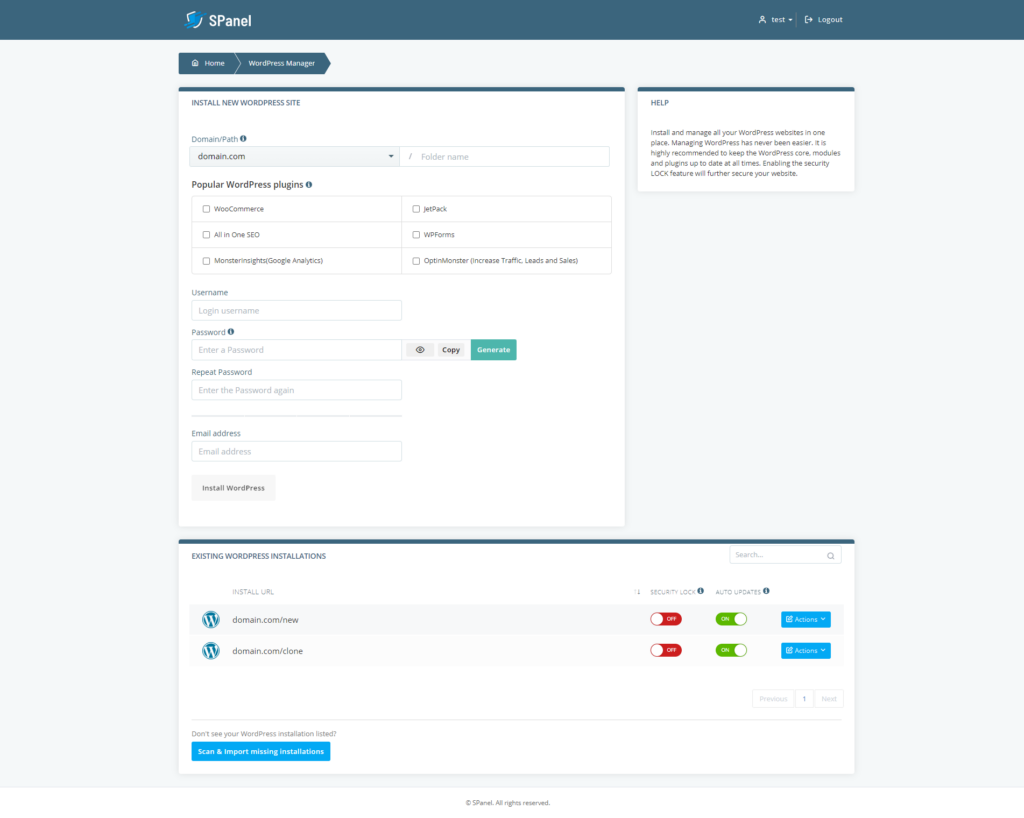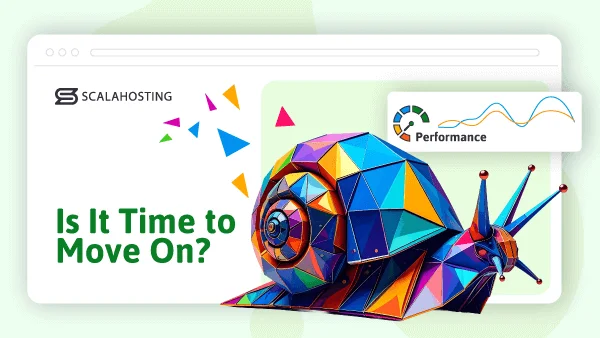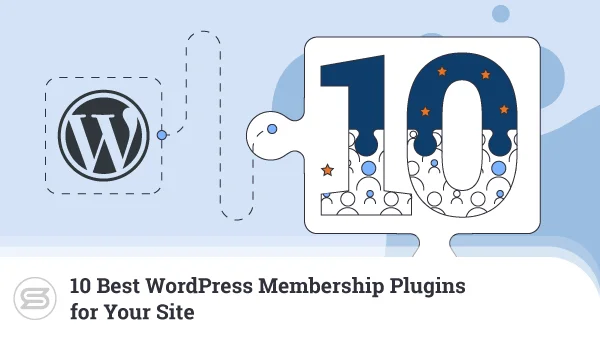It might not be a bad idea to have a strategy when you start a new WordPress project. Things might not necessarily go exactly the way you imagine them, but planning ahead will give you a clearer vision of where your website is heading and how it’s growing.
Although many people underestimate it, the hosting service is a significant part of this process. A reliable, easily scalable account guarantees that your website performs well while also ensuring you don’t pay too much.
Sounds great, but is it really possible to find such a solution?
Let’s find out.

What Is Scalability in Web Hosting?
Like any other software application, WordPress runs its own processes and uses the hosting server’s hardware resources to respond to requests and database calls initiated by users’ browsers and WP add-ons.
The more visitors your website has and the more plugins, themes, and other modules you install, the more requests and database calls WordPress will need to process. Hence, the more hardware resources you’ll need. If you don’t provide them, your site’s performance will deteriorate, and you could even experience some downtime.
This is something you should definitely bear in mind when choosing a hosting setup for your website. You want to make sure you can add more resources to your account whenever you need them. Crucially, the upgrade must be as seamless as possible. Any glitches will be immediately noticeable to the site’s visitors, resulting in lost business.
But which type of hosting gives you the best scalability?
It’s best to examine the different variants individually and see how they stack up.
Shared hosting
Let’s start at the low end – shared hosting. For a few dollars per month, you get a hosting account that is suitable for a small-to-medium-sized website. Usually, you get a choice of a few shared plans, each coming with its own limitations in terms of things like storage space, bandwidth, CPU power, etc.
You can switch between plans with relative ease, so if you’re starting from scratch, you can go for the cheapest plan and work your way up when you need to.
Projects with limited budgets can certainly benefit from shared hosting’s low price. Still, you need to remember that it’s not a suitable long-term solution if you’re planning any sort of significant growth. A shared hosting plan’s performance is limited because you use the same hardware resources as hundreds of other websites. Any one of these websites can slow the server down, compromising your project’s loading speeds as well, so consistency and reliability are not great, either.
Dedicated servers
At the other end of the spectrum, you have dedicated servers. Your monthly hosting bills run well into the three-figure range because you get an entire physical server all to yourself. It’s a powerful solution suitable for big websites, but the high price keeps it out of reach for most projects.
A dedicated server’s scalability isn’t great, either. If you reach its limits, you have to either move your files and databases to a more powerful machine or have a data center technician upgrade the hardware configuration of the current one.
The first option is fraught with difficulty and could easily backfire if it’s done incorrectly. The second one results in unavoidable downtime.
Another thing you need to bear in mind is that the expenses associated with getting more power from a dedicated server are astronomical.

VPS hosting
VPS hosting gives you the best of both worlds. On the one hand, it’s relatively affordable. Virtual servers are much cheaper than dedicated ones, and in recent years, the prices have been edging closer to the shared hosting plans.
Meanwhile, you have guaranteed hardware resources and a dedicated IP for much better, more consistent performance and security.
However, VPS hosting’s most significant advantage is its scalability.
Because you’re running a virtual server rather than a physical one, you don’t need to swap hardware components to upgrade its configuration. Usually, an upgrade is a two-click job, and it might not even require a VPS reboot.
Your virtual server is usually situated on a powerful cloud cluster, so you have as good as unlimited room for growth. You can potentially create a virtual server that is more powerful than a dedicated one.
Meanwhile, if your host allows you to customize the VPS configuration, you can optimize your expenses by only paying for resources you actually need.
Is WordPress Scalable?
Many people mistake WordPress for a simple website-building application suitable for small-to-midsize projects that don’t really attract much attention. In reality, it’s a lot more than that.
Well over half of all websites built with content management systems are based on WordPress, and some of them are not small projects at all. An estimated third of the world’s top 1 million websites run on WordPress.
In other words, WP can facilitate your site’s growth pretty well.

What Server Resources Can You Scale?
WordPress won’t mind the traffic and popularity, but if you don’t host your project on a powerful enough server, you won’t get the decent performance your users demand. So, let’s look at how the different components affect your performance and how they can be scaled to ensure your site runs smoothly.
CPU
Your CPU usage is determined not only by the number of visitors your website registers but also by the plugins you install. The more plugins you have and the heavier they are, the more processes your server will have to run simultaneously. If it doesn’t have enough processing power, some of these processes will crash, and your site will stop responding.
On a shared plan, scaling the CPU means upgrading to a more powerful plan which allows for a higher number of processes running simultaneously.
On a VPS, you get virtual CPU cores. Every virtual core has a capacity that equals about 25% of a hardware one.
RAM
The processes launched by your plugins need a storage facility for storing and retrieving information quickly. This is where RAM comes in. It’s measured in GBs, just like it is on your home computer.
When it comes to shared hosting, RAM is allocated on a first-come-first-served basis. The same hardware resources are shared among many people, and RAM availability depends on what other websites are doing.
With a VPS, you know exactly how many GBs of RAM you have, and you can use them whenever you need them. Upgrading your virtual server’s RAM usually takes no more than a couple of clicks.

Disk Space
It’s usually pretty easy to see how much storage space you’re using at any given time. How much you’ll need in the future depends on many factors, including the type of files your website uses and how much data users generate.
Some providers claim that they give you unlimited storage on even their cheapest shared plans. However, this often ends up being misleading, with the fine print giving them the option of stopping your account if you use too much storage space.
By contrast, the storage capacity of a virtual server is clearly defined. You know how much space you’ve got from the start, and you can easily get more when your site grows bigger.
Extra services
Hosting providers know that you’ll need some additional features as your website grows.
For example, 24/7 monitoring can improve uptime, and if you have multiple daily backups, you can ensure that should something go wrong, you can get everything back up and running in no time.
These, as well as other services, can be of great help once your website attracts a larger audience.
ScalaHosting and Scalable WordPress Hosting
Having hosted websites of all shapes and sizes, we know how difficult it is to get a project going sometimes. Even when your business gains some speed, it’s not always plain sailing.
We wanted to ensure we have a solution for you every step of the way, which is why we built our portfolio of services mainly around our flexible managed VPS plans. You can start with a less powerful package and upgrade it according to your needs. You can customize the virtual server’s configuration, so you won’t need to pay for resources you don’t need.
As a WordPress user, you’ll like SPanel, as well. It’s our proprietary management platform that is included free of charge in your managed VPS package.


In addition to allowing us to offer fully-managed VPS plans at affordable rates, it comes with everything you need to manage your server and the websites hosted on it.
Among its arsenal of tools, you’ll find the SWordPress manager – a unique platform that helps you set up WordPress and manage the installation. With a few toggle switches, you can clone your website, enable automatic updates, change its password, or delete it.

Conclusion
Your hosting account may be an excellent environment for your project’s growth, but if you don’t choose carefully, it can act as a bottleneck in terms of both hardware resources and effects on your budget.
Ideally, you shouldn’t pick your hosting service on the go. You need a solution that will provide you with excellent value for money when your site is still small and plenty of upgrade options when it starts to grow. If you find it from the word go, you will save yourself a whole lot of trouble later on.
FAQ
How scalable is WordPress?
With the right hosting environment, you have pretty much no limit on how big your website can become. WordPress has proven itself a brilliant platform for both small, personal websites with a limited number of visitors and large projects and popular online services that attract millions of unique hits.
How do I ensure my WordPress website scales well?
You need to set yourself up in advance for your site’s growth. If you do any custom development work on it, ensure your code is as clean as possible. Regularly update and audit your themes and plugins to ensure only the ones you need are installed and up-to-date. Last but by no means least, make sure your site has enough hardware resources to handle all the traffic and perform well.
Is WordPress losing popularity?
Despite the appearance of a few website-building platforms, there’s nothing to suggest they will be able to catch up with WordPress in terms of popularity. About 40% of all active websites are WP-based, and the CMS continues to attract more and more users with, among other things, its ability to scale well.


